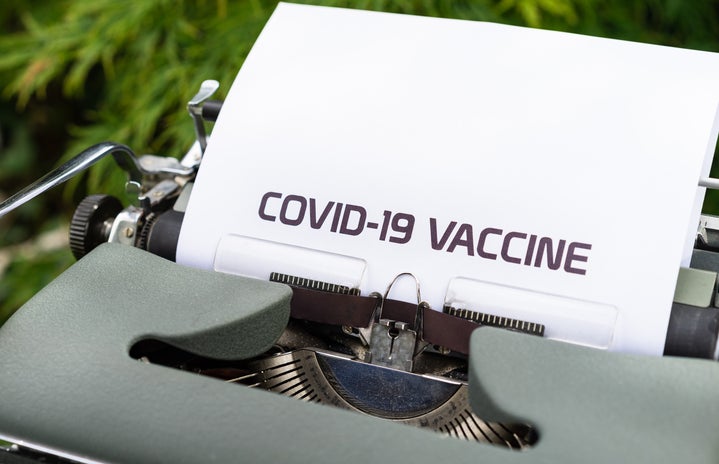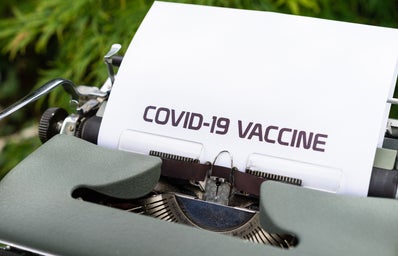The Coronavirus pandemic is coming up on its one year anniversary of the first lockdown, and in this past year, companies have been rapidly manufacturing and testing different vaccine options. With vaccines becoming more widely available to the public, people are faced with a choice of whether to get it or not. Understandably, there are mixed emotions on the creation of the vaccine. I, myself, thought long and hard before I accepted the appointment for my vaccination. In the end, I decided that ultimately, the good outweighed the bad, and that is the choice that everyone has to make for themselves. I am simply here to give some personal insight on my experience for anyone who might be on the fence or wanting to hear what the process is like.
I am considered high risk for Covid-19 because I have extremely severe asthma. It may sound small, but trust me, my many hospital visits dare to disagree. The first phase for the vaccine included healthcare workers and anyone who comes into contact with immune-compromised people or patients. The second phase includes extremely high risk patients and anyone aged 65 or older. I was not expecting to be included in this wave, but I got an email from my doctor saying that they looked at my records and I was deemed “high risk,” therefore eligible to make an appointment and get the vaccine. After much research, I decided that getting the vaccine was what is best for me and my situation, so I went online and chose my time slot at The Woodlands Texas Children’s Hospital.
On the day of my vaccine appointment, I made the drive and when I got there, the process was simple. I walked in, they gave me a new mask to wear in the hospital and a wristband, and then I was on my way to fill out paperwork. The only paperwork I had to fill out was a small survey about whether or not I have had any symptoms or been exposed, then after that, I was escorted to a room with lots of vaccination stations set up. After being introduced to the nurse administering my vaccine, I received the first dose of the Pfizer Covid-19 vaccine, then waited 15 minutes under observation.
There are two active Covid vaccines, Pfizer and Moderna, and by the end of March, the Johnson and Johnson vaccine will also be made widely available. The Pfizer and Moderna vaccines use mRNA to make a surface protein (or spike) on the SARS-2 virus. These vaccines have two doses, Pfizer second dose taken 21 days after the first, and Moderna second dose taken 28 days after the first. The Johsnon and Johsnon vaccine directly creates a spike to trigger an immune response and is composed of only one dose. It is important to note, however that none of the vaccines put the virus into your body.
More Information on the Different Covid Vaccines:
https://www.cdc.gov/coronavirus/2019-ncov/vaccines/different-vaccines.html
https://www.goodrx.com/blog/johnson-and-johnson-covid-19-vaccine/
https://www.memorialhealthcare.org/covid-19-vaccines-pfizer-vs-moderna-whats-the-difference/
The only reaction I had after the first dose was a very sore arm, but reactions can vary based on the person. Exactly 21 days from my first dose, I was scheduled to go back for my second dose. I was a bit more nervous for this one because I had read that many people feel sick after their second dose just because of the immune response and changes happening. The check in process was exactly the same as for my first dose and I still had to wait 15 minutes after getting it just in case I had a reaction. After I was cleared to leave, I drove back to Waco and continued to monitor for any symptoms. When I woke up the next morning, I was expecting to feel sick or have a fever, but none of it was there. It has now been two days since getting the vaccine and I have had no symptoms except a hardcore headace all day. The presence of symptoms after the second dose varies for everyone, but for me, it was only a headache and a small welp where I got the vaccine.
Some possible symptoms of the vaccine could include tiredness, headache, fever and chills. These are all normal and according to the CDC reporting, they are typically mild, however, some people have reported severe cases of the symptoms after the second dose. You should not get the vaccine if you have had a past allergic reaction to any of the vaccine’s ingredients, which they go over with you at the beginning of the appointment. Symptoms of anaphylaxis, or an allergic reaction, include hives, wheezing and swelling. Under the 15 minute observation period, they are looking for any negative strong reactions to the vaccine such as anaphylaxis or any rapid onset and extreme symptoms.
The Pfizer vaccine has shown a 95% efficacy rate against Covid-19 three weeks after the second dose. The Moderna vaccine has a 94.1% immunity rate three weeks after the second dose, and the Johnson and Johnson vaccine has a 90% efficacy rate after a month. This means there is still about a 5-10% chance a vaccinated person could catch Covid and be symptomatic. This also means there is a chance to carry Covid, but since the person is vaccinated, they could be asymptomatic and never know. There are also new and developing strands of Covid-19 that are popping up across the world that were not completely covered by the vaccine. Because of this, it is important to still wear a mask and be safe around others until more of the population is vaccinated and until they create a booster vaccine for all strands.
I had a positive experience with the vaccine and will continue to monitor for symptoms and be safe around others. My hopes for this article is that anybody reading who is curious or considering getting the vaccine can hear a first person account of the experience. I know that when I was researching, I loved to read first person accounts and hear how it went for them, so if I can even help a few more people gain insight, my goal is accomplished. I was nervous about the vaccine, but in the end, I am glad I did it and if you are faced with the choice of whether or not to vaccinate, just do your research and realize that it has been tested multiple times and lots of people, including myself, have safely received the vaccine.
If you feel that you want to check if you qualify and join a waitlist for the vaccine, this website is a great resource: https://www.npr.org/sections/health-shots/2021/02/18/967448680/how-to-sign-up-for-a-covid-19-vaccine-in-your-state


